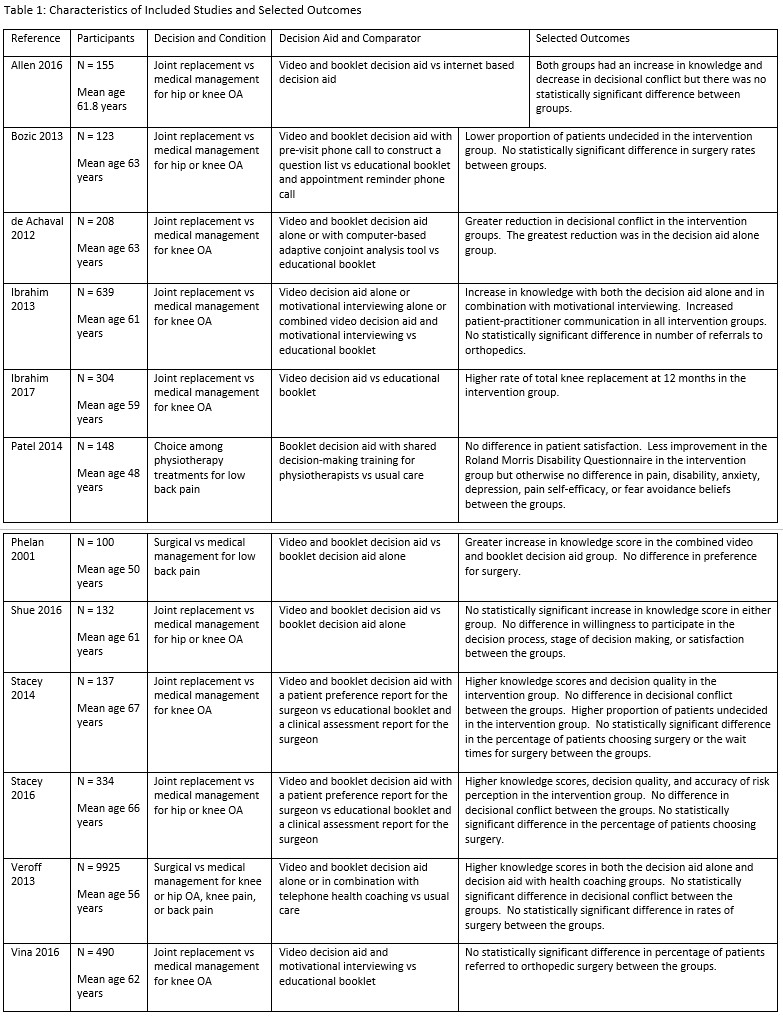Session Information
Date: Tuesday, October 23, 2018
Title: Patient Outcomes, Preferences, and Attitudes Poster II: Patient Perspectives
Session Type: ACR Poster Session C
Session Time: 9:00AM-11:00AM
Background/Purpose:
Chronic musculoskeletal (MSK) pain is common and disabling; it is among the top reasons for doctor’s visits in the US. Most treatment decisions for chronic MSK pain are preference-sensitive, meaning that there is more than one reasonable treatment option. Patient decision aids (PDAs) are tools to help patients participate in their healthcare decisions. We performed a systematic review of PDAs for adults deciding about treatment for chronic MSK pain.
Methods:
We searched Ovid MEDLINE, Ovid MEDLINE In-Process and EPub Ahead of Print, Ovid Embase, Ovid PsycINFO, EBSCO CINAHL, Cochrane CENTRAL, clinicaltrials.gov, and the International Clinical Trials Registry Platform from inception until March 2017. We included randomized controlled trials of adults using PDAs to make treatment decisions for chronic MSK pain in the outpatient setting. We evaluated outcomes related to decision making (knowledge, accurate risk perception, choice congruence with values, decisional conflict, patient-practitioner communication, satisfaction), pain, functional status, and surgery utilization.
Results:
We reviewed a total of 342 abstracts, and 12 met our inclusion criteria. Five studies evaluated patients with knee osteoarthritis (OA) alone. Four studies evaluated patients with either hip or knee OA. Two studies evaluated patients with lower back pain. One study evaluated patients with knee pain, back pain, knee or hip OA.
In one study, patients used the PDA to decide between conservative management options for chronic lower back pain. This was the only study that evaluated pain and function outcomes. There was less improvement in one disability score but otherwise no difference with the PDA compared to control.
In the other 11 studies, patients were deciding between surgical and medical management using a video PDA. Seven of eight studies found no difference in the proportion of patients choosing surgery. The effects of the PDAs on decision-related outcomes were mixed. Six of seven studies found improved knowledge scores with use of a PDA. Two of five studies found an improvement in decisional conflict with use of a PDA. The addition of motivational interviewing, an adaptive conjoint analysis tool, or telephone based health coaching to a PDA did not improve any of the outcomes compared to the use of the PDA alone. Characteristics of included studies and selected outcomes are reported in the table.
Conclusion:
PDAs may improve the decision-making process and decision quality for patients deciding between operative and medical management of hip/knee OA and chronic back pain. Additional research is needed to evaluate the effect of PDAs on pain and function. Especially for older adults with multi-morbidity and polypharmacy, who are often not surgical candidates, further research should develop PDAs for non-surgical treatment of chronic MSK pain.
To cite this abstract in AMA style:
Nayfe R, Bowen E, Milburn N, Mayo H, Halm E, Reid M, Fraenkel L, Makris UE. Systematic Review of Patient Decision Aids for Chronic Musculoskeletal Pain [abstract]. Arthritis Rheumatol. 2018; 70 (suppl 9). https://acrabstracts.org/abstract/systematic-review-of-patient-decision-aids-for-chronic-musculoskeletal-pain/. Accessed .« Back to 2018 ACR/ARHP Annual Meeting
ACR Meeting Abstracts - https://acrabstracts.org/abstract/systematic-review-of-patient-decision-aids-for-chronic-musculoskeletal-pain/

